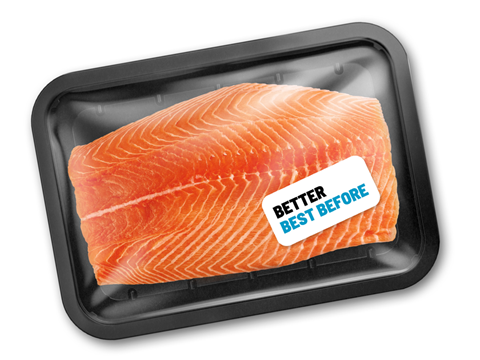
Credit: Freshr
Freshr has completed an oversubscribed seed funding round for its proprietary antimicrobial coating for recycled, recyclable, and compostable fresh fish packaging – a solution designed to extend shelf life, reduce waste, and save money.
According to Freshr, $2.6 in annual economic food losses and 10% of greenhouse gas emissions can be attributed to global food waste.
In response, it has applied an advanced, naturally-derived antimicrobial coating to its FreshrPack Sheet, Roll, and Bag film formats. Reportedly, this technology can be chemically immobilized into post-consumer recycled, recyclable, and compostable materials, which are distributed in rolls in hopes of easier implementation compared to standard modified atmosphere packaging.
FreshrPack materials are designed to slow bacterial and chemical spoilage and avoid water loss in fresh protein products, starting with fish. In doing so, they are believed to extend shelf life by between 15% and 30% – apparently, the FreshrPack Bio-Active Film keeps salmon fresh for 2-4 extra days – as well as reduce waste by 50% and capture around $37 per year.
Unlike conventional coatings and diffusion technologies, FreshrPack is not considered a food additive and reportedly negates the need to disclose its use on product labels. The High OTR film is described as ‘compliant with the rigorous FDA requirements’.
Additionally, the FreshrPack Roll and Bag products are said to be completely biodegradable in an industrial composting facility.
The latest seed funding round saw investments from Diamond Edge Ventures, Nàdarra Ventures, BDC’s Climate Tech Fund, and Blue Tide Capital Ventures, alongside a third investment from Invest Nova Scotia.
Freshr plans to use the funds to boost its manufacturing processes, expand its global presence, convert its existing partnerships into early revenue, and strengthen its team’s business and engineering expertise.
“It is extremely validating that this round was oversubscribed,” says Freshr’s CEO and founder, Mina Mekhail. “We recognize the impact and influence of these investors and acknowledge the immense value in having investors who share our drive for global impact. They are critical to the company’s strategic growth.”
Jen Fuccillo, investment principal at Invest Nova Scotia, continues: “Freshr has developed a novel technology with substantial potential for reducing food waste on a global scale.
“By extending the shelf-life of fresh proteins, Freshr’s solution lowers the environmental impact of the food industry, extends freshness to enhance the quality of the food being consumed, and provides suppliers with precious extra time to reach market – all without added ingredients. This is a powerful value proposition.”
“Food waste and food insecurity are pressing global challenges, and tackling them is central to Nàdarra’s investment thesis,” says Malcolm Fraser, managing partner of Nàdarra Ventures. “Freshr’s naturally derived active packaging technology significantly extends the shelf life of high-value proteins, ensuring safer, fresher food while reducing waste at every stage of the supply chain.
“By solving this issue in a new way, Freshr is not only cutting economic and social losses but also reshaping the future of sustainable food packaging. We’re excited to support Mina and the Freshr team as they bring this breakthrough technology to market.”
Curtis Schickner, president of Diamond Edge Ventures, adds: “We believe that the future of packaging lies in smart, sustainable solutions that extend food freshness while reducing environmental impact.
“Freshr’s cutting-edge approach to active and sustainable food packaging aligns with Mitsubishi Chemical Group’s emphasis on minimizing food loss throughout the supply chain.
“We look forward to supporting Freshr as they scale their technology and bring active food packaging to market.”
“More than one third of all fresh proteins are wasted, either in transport or on retail shelves,” concludes Matt Stanley from BDC’s Climate Tech Fund. “With Freshr’s innovative, low-cost, and drop-in antibacterial coating and active packaging technology, it can reduce spoilage of fresh proteins across the supply chain, thereby reducing the amount of organic waste.
“By minimizing food waste, Freshr is helping to build a better and more sustainable food chain.”
In another development, OSY Group has revealed that it is trialling its flagship antimicrobial technology, Xtend, across four continents. This solution uses microscopic pins on packaging surfaces to puncture and kill microbes – a move intended to increase the shelf-life of fresh produce and reduce food waste.
DS Smith has also unveiled a seafood box made of corrugated board; DryPack is designed to keep fish fresh at under 40°F (~4.44°C) for over 40 hours in cold chain operations while lowering both costs and CO2 emissions. Its ‘patented and proven’ Greencoat technology is USDA, CFIA, FDA, and FBA-certified, and the pack itself is reportedly the only containerboard seafood box to be approved for air freight by the International Air Transport Association for long-distance transit.
If you liked this story, you might also enjoy:
The ultimate guide to the Packaging and Packaging Waste Regulation in 2025
How are the top brands progressing on packaging sustainability?
Everything you need to know about global packaging sustainability regulation in 2025
The key to increasing the use of reusable packaging in supermarkets














No comments yet